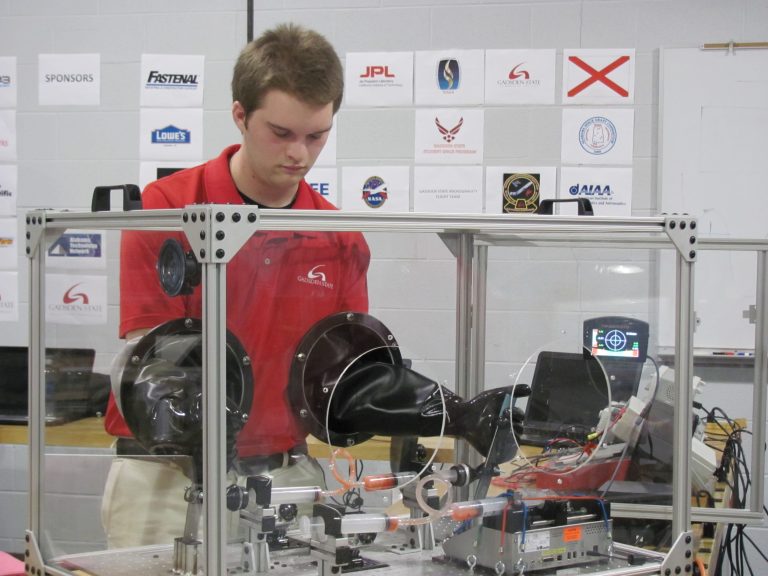By Donna Thornton/News Editor
Gadsden State Community College’s Zero G team has boldly gone where no group of community college students have gone before – teaming with NASA scientists for an experiment bound for the International Space Station.
A group of electronic engineering students went to Johnson Space Center in Houston to test an experiment they’ve been working on that could help develop a way to provide astronauts with potable water on a future mission to Mars. Their experiment is to evaluate the way organic solvents – stuff dissolved in water or other liquids – react under zero gravity conditions.
That means the team members will be flying on the “vomit comet,” a DC9 designed specifically for parabolic flight – a flight pattern that creates a period of zero gravity like the condition astronauts experience during space flight.
Team leader Steven Ma-rtinez, members Jacob Lynch, Johnathan Williams and Josh Gaddy and their instructor/mentor, Audrey Webb, aren’t the only ones walking on air as a result of a partnership that is unprecedented for community college students.
The teams selected to participate, doing experiments that could aid in NASA missions, come from Boise State, California Poly Tech, Georgia Tech and MIT, GSCC Dean of Technical Education and Workforce Development Tim Green said.
“That’s pretty good company for a community college,” Green said. “Technology and learning is what we’re all about at Gadsden State, no matter what program you’re in.”
The team demonstrated and talked about the experiment during spring break week – when they were on campus, working on the project, while other students were free from classes.
“We’ll get our spring break next week in Houston,” one of the members said.
The Gadsden State team learned of the possibility of developing experiments for NASA in October and submitted an application. They learned in December the team had been selected not only to participate, but to be one of the earliest teams to come to Houston, which gave them a shorter time to complete their experiment than many of the other colleges.
The project is geared toward finding a way to recycle waste water to make it safe to drink on a space mission, because it would be impossible to take enough drinking water for a months-long, even years-long mission.
Webb said includes recycling all kinds of waste water, even that produced by people. The GSCC project involves moving liquids through tubing. While doing so in that DC9’s zero gravity stage of flight, the experiment will be monitored to see if solvents in the liquids behave differently in zero gravity.
The Zero G team is made up of students from different backgrounds. Martinez is an Auburn University Aerospace Engineering graduate from Attalla. Lynch, from Wellington, plays saxophone in the Gadsden State Show Band in addition to studying electronic engineering. Josh Gaddy is an Early College Enrollment student, a senior at Piedmont High School, and Johnathan Williams is a displaced worker from Piedmont, who returned to school to retrain after his previous place of employment closed.
“This ‘remote’ internship with NASA is a very special and unique opportunity for our students,” GSCC President Raymond Staats said in a press release. “This is the first time a community college team has been offered this opportunity, and it will no doubt be a life-changing experience for our students.”
After the Houston trip, the team will work to make their experiment smaller and work with NASA to automate it so that it can be run without human interface. It will then be launched to the international space station, and the team will be on hand for the launch.
In addition to this experience, the team also has an internship opportunity in Pasadena, Calif., working in the Jet Propulsion Lab on robotics to be used in future space exploration.





